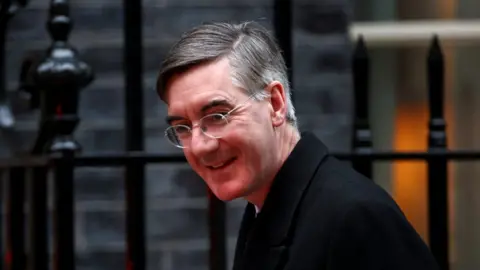Jacob Rees-Mogg says little evidence Brexit hit trade
 Reuters
ReutersEvidence that leaving the EU has damaged UK trade is "few and far between", the government's Brexit opportunities minister has said.
Jacob Rees-Mogg, who was handed the new role last week, said recent drops in exports had been caused by disruption during Covid.
He argued that Brexit was "already a success" and is boosting the economy.
But the Office for Budget Responsibility said there was a Brexit hit to trade with the EU.
The UK left the EU's trading regime in January 2021, 11 months after it left the bloc - with its trade now governed by a post-Brexit trade deal.
Since then, British businesses have experienced additional paperwork and border checks when exporting products to EU countries.
Last week, a cross-party committee of MPs said that new arrangements for the UK-EU border had added costs to exporting businesses.
In a report, the Public Accounts Committee said trade had been "suppressed" since the UK cut formal trade ties in January 2021, due a combination of Brexit, Covid and global economic problems.
The MPs said it was not possible to separate out the precise impact of each factor, but it was "clear" that Brexit had had an impact.
Official trade statistics show UK exports to the EU in the first ten months of 2021 were down 12% on pre-pandemic levels, in a year hit by disruption.
UK imports from the EU were 20% lower than before the pandemic.
'Extremely beneficial'
Asked by the BBC about falls in trade during a visit to the port of Felixstowe, Mr Rees-Mogg said Covid had caused "the most enormous disruptions to supply chains".
"We've had containers simply being stuck the wrong place, being stuck in Chinese ports, being stuck in the port of Los Angeles," he added.
"This has been a global trade issue - and we do have to recover from the problems of Covid".
Asked whether Brexit had reduced UK trade, he replied: "I think Brexit has been extremely beneficial for the country.
"I think the evidence that Brexit has caused trade drops is few and far between."

Is it Brexit or Covid?

The way the UK trades with the EU changed on 1 January 2021, at a time when trade was also being affected by the pandemic, making it hard to distinguish the impact of each of them.
Fortunately, the independent Office for Budget Responsibility (OBR), which comes up with economic forecasts for the government, has tried to separate the two.
It said at the time of the Budget in October that both imports and exports with the EU had been hit by Brexit and that both were on track to end up 15% lower as a result of the UK leaving the EU.
But the OBR said it was too early to know for sure because, for example, some of the barriers to trade agreed with the EU had not yet come into force.
It pointed to research from the Centre for European Reform, which concluded that in October 2021 the UK's trade in goods with the EU had been 15.7%, or £12.6bn lower, than it would have been without Brexit.
The gap had been between 11% and 16% each month of 2021.

New research from the British Chambers of Commerce has suggested many firms do not believe post-Brexit trading arrangements have helped trade with the EU.
In a survey of 1,000 UK exporters by the business group, seven out of 10 of those polled said the UK's trade deal with the EU was not enabling their business to grow.
Liberal Democrat business spokesperson Sarah Olney said the research showed British firms believe the deal is "simply not good enough".
"Claims from the likes of Jacob Rees-Mogg about Brexit opportunities ring hollow for businesses being drowned in paperwork and delays at our borders," she added.
EU laws overhaul
In his new cabinet job, Mr Rees-Mogg has been tasked with finding opportunities to make UK businesses more competitive by changing or removing EU laws copied over after Brexit.
Since Brexit, the UK has moved away from EU laws in certain areas, including on immigration, payments to farmers, and gene-editing rules for crops.
But the prime minister has been under increasing pressure in recent months from MPs on the right of his party to go further.
The government has promised to introduce a new law to streamline the process for removing or amending EU laws the UK has inherited.
